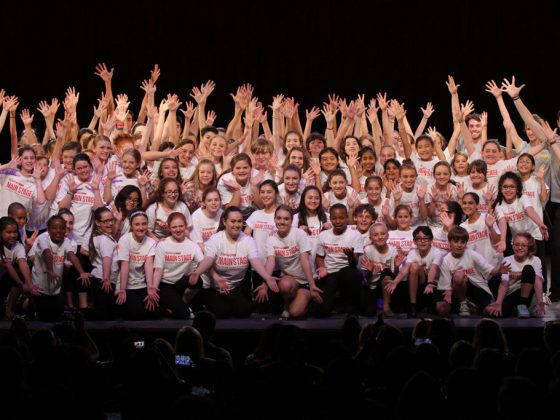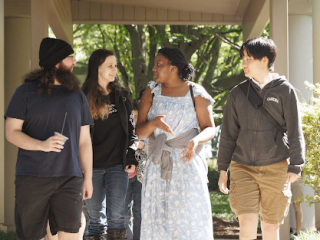The signs are clear: Quoting favorite movie or play lines. Sweeping through the house while belting “Defying Gravity”. Social media time dedicated to Broadway and scouring the internet for the latest bootlegs. You have a Theatre Kid. No matter the age or interest level, there are some tried and true qualities that we have to remember.
Theatre Kid Types
I’ve worked with actors of all ages–from kindergarten to retirement. And every one of them has a common trait: They love theatre and find a home and family with the theatre company. Participating in a show makes them happy.
Theatre groups have space for a wide range of people. Some Theatre Kids crave the spotlight and love to be center stage. Some Theatre Kids enjoy being a part of the ensemble and are content to support those in the spotlight. Some Theatre Kids prefer to be backstage and learn how to shine that spotlight for others.
As parents, its important that we support our Theatre Kids, no matter what role they have. It is always disheartening when a Theatre Kid tells me that their parents won’t let them participate in the show because they didn’t get a lead. More important than the cast list is developing a supportive environment for every Theatre Kid.
Theatre Kid Habits
Theatre kids are driven by their desire to create. Get a bunch of Theatre Kids together, and they are often loud and rambunctious. And they are fun.

One of my favorite Theatre Kid habits is the spontaneity. For example, they’ll share their favorite show tunes with each other, begin singing along, figure out the four-part harmony, and create choreography to match. In the span of 15 minutes, without any prompting, they’ll have a full dance rehearsal for Anything Goes in the hallway outside the auditorium. It’s just what they do.
However, it’s also necessary to rein them in. Theatre Kids can get pretty wild–even when they shouldn’t be. It’s OK (and necessary) to reinforce proper theatre etiquette. Here’s an example: I was at a show with thousands of high school theatre students to see Heathers. As soon as “Candy Store” started, at least half of the auditorium erupted in screams and cheers, drowning out the first lines of the song. Even though these kids showed their absolute joy, they were disrespectful to the performers and other audience members.
Theatre Kid Schedules

Perhaps you feel as though your life has been hijacked and is now at the whim of a flimsy piece of paper stuck to the refrigerator door. It details weeks–if not months–of after-school and weekend rehearsals.
It is so important to stick to that rehearsal schedule – for parents and their Theatre Kids. Adhering to the schedule (sometimes it does change) reinforces the responsibilities of working in a collaborative environment. Conflicts always happen, but if conflicts keep Theatre Kid from attending rehearsal on a regular basis–whether doctor’s appointments or transportation difficulties–Theatre Kid might be seen as unreliable. In creative ensembles and collaborations, reliability is a vital work ethic.
As parents, we have to be reliable, too. If our kids can’t drive yet, it’s important that we drop them off on time (we often say early is on time and on time is late) and pick them up immediately. Theatre Kids hate being late, and hate being the last ones hanging around outside the theatre.
Theatre Kid Parents
One of the best things a parent can do is meet Theatre Kid’s teacher. This seems obvious, but it’s surprising how many parents skip school conferences or wait in the car for Theatre Kid to run out following a rehearsal. Take the time to introduce yourself. You might meet other Theatre Kid parents. Perhaps phone numbers will be exchanged and carpools can be arranged.
In many theatre programs, there are opportunities for parents to be directly involved, whether booster clubs or painting sets. However, don’t necessarily expect Theatre Kid to get something because you’ve volunteered your time. I once had a parent offer to make her kid’s costume–if her kid got a lead role. This bargaining is not only uncomfortable, but unethical. It means more to Theatre Kid when parents are involved consistently rather than conditionally.
When Theatre Kid Becomes Theatre Adult
A sizable chunk of my experience as a director has been working with high school kids. The most successful Theatre Kids have had Theatre Parents right there with them, cheering them on every step of the way. Some of these students have gone on to earn degrees in theatre arts.

More importantly, involvement in theatre helped these students develop confidence, creativity, critical thinking, and collaborative skills. These traits extend beyond the stage and lead to success in all facets of life, whether Theatre Kid becomes a professional actor or not.
As Theatre Kids parents, we should be proud of every accomplishment our children have onstage (or off). While we want them to learn and consistently improve through their participation in theatre arts, always remember that Theatre Kid should have fun. After all, it’s called “play” for a reason.














